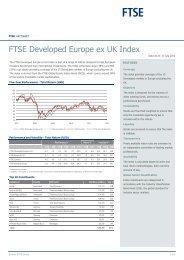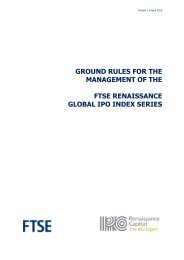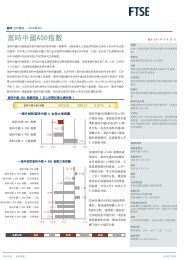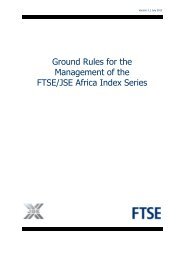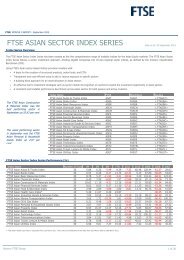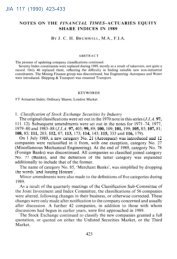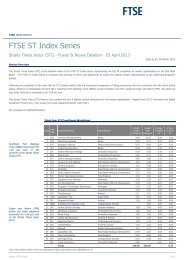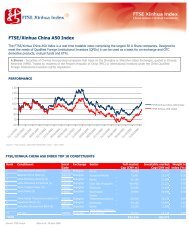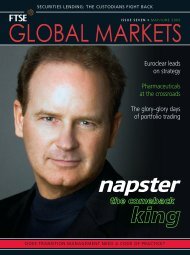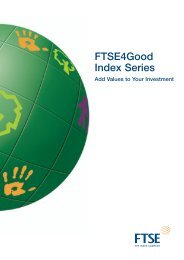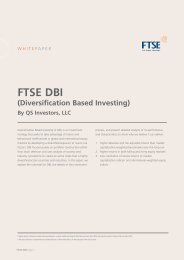Create successful ePaper yourself
Turn your PDF publications into a flip-book with our unique Google optimized e-Paper software.
strategies and <strong>FTSE</strong> Group has expanded its range of short<br />
and leveraged indices; <strong>FTSE</strong>’s 100 Short Index serves as the<br />
basis for DB x-trackers <strong>FTSE</strong> 100 Short ETF, as part of its<br />
short ETFs range.The new indices allow money managers to<br />
exploit volatility in the UK market by allowing investors to<br />
go short the market or gear up. The indices will serve as the<br />
basis for ETFs, benchmarks and other index-linked financial<br />
products and are an extension of <strong>FTSE</strong> Group’s range of<br />
investment strategy indices that are designed to provide<br />
asset managers with strategic investment tools.<br />
Another area where indices are making headway is in the<br />
emerging and frontier markets such as Africa and the Middle<br />
East. Emerging and frontier markets are areas in which many<br />
index providers have a growing presence. This divergence<br />
from the developed world towards the new geographies<br />
reflects the eagerness of investors to ensure they can achieve<br />
a well diversified portfolio while, at the same time, having the<br />
confidence of being able to rely on a transparent<br />
methodology they can track. ETF providers are no strangers<br />
to this fact.As a result, there has been an explosion of country<br />
based ETFs from the BRIC countries down to the Sub<br />
Saharan region of Africa and across the Middle East, such as<br />
the Lyxor ETF based on the <strong>FTSE</strong> Coast Kuwait 40 Index.<br />
This move also ties in well with the increase in the<br />
number of stock exchanges around the world that are<br />
bidding to create new regional and partner indices in order<br />
to gain market exposure to an international investment<br />
community and which provide the underlying<br />
infrastructure for such ETFs. As a global index provider,<br />
<strong>FTSE</strong> Group works with over 18 stock exchanges across the<br />
world to provide indices created to enhance growing<br />
economies, such as that achieved with the JSE (South<br />
Africa) and ATHEX (Greece). Such partnerships are a<br />
perfect example of the potential successes from combining<br />
domestic know-how with international distribution to<br />
bring innovative product to market.<br />
Simultaneously amid the tumultuous conditions the<br />
industry is faced with, index providers are now more than<br />
ever a much needed auxiliary to banks’ in-house quant<br />
teams who choose not to solely manage and calculate<br />
proprietary indices. Increased collaboration between these<br />
two parties can prove mutually beneficial, with banks<br />
profiting from credible products based on objective third<br />
party run indices and the index provider gaining new<br />
business opportunities. These trends have largely been<br />
driven by the growing requirement among investment firms<br />
for transparency, risk management and cost efficiency.<br />
Moreover, it is also increasingly important these days within<br />
the industry to harness real and focused expertise.<br />
Equally, the world of indexing has moved on<br />
considerably and over the past few years at <strong>FTSE</strong> Group,<br />
there has been a wave of index innovation from the<br />
introduction of the much lauded Sharia compliant indices<br />
and infrastructure indices to the creation of indices that<br />
cover issues such as responsible investment. Most recently<br />
there has been significant development undertaken on<br />
environmental technology indices. In combination, all of<br />
F T S E G L O B A L M A R K E T S • J A N U A R Y / F E B R U A R Y 2 0 0 9<br />
Imogen Dillon Hatcher, executive director, <strong>FTSE</strong> Group. Photograph<br />
kindly supplied by <strong>FTSE</strong> Group, December 2008.<br />
these are ripe for and have formed the basis of structured<br />
products such as ETFs.<br />
The creation of new ways to benchmark has not stopped<br />
at existing asset classes either. Alternative asset classes<br />
such as real estate investment trusts (REITs) and hedge<br />
fund of funds (HFoF) have also taken off and these have<br />
gone some way to provide investors with greater choice<br />
over and above the traditional equity class.<br />
Indices, ETFs and the future<br />
With transparency being the buzzword of the moment, it is<br />
clear that both index and ETF providers must work<br />
together to ensure investors are not only served but also<br />
kept informed and educated. The use of open and<br />
transparent rules driven methodology in addition to<br />
independent index committees (made up of market<br />
practitioners) is vital for a healthy and most importantly<br />
tradable index, a philosophy which <strong>FTSE</strong> Group applies<br />
across its 120,000 indices. With a migration towards passive<br />
management and a resurgence of portfolio rebalancing, it is<br />
evident that indexing is a first choice for investors looking<br />
for that long term investment in a transparent, risk<br />
managed and cost effective way.<br />
The ETF market, in common with all areas of the<br />
financial arena, becomes ever more competitive and in our<br />
view is nowhere near saturation. ETF players are ensuring<br />
healthy competition through increasing innovation,<br />
creating original products driven by investor demand.<br />
They will continue to add credibility to this investment<br />
segment and emphasise the benefits of a ready-made<br />
diversification of index tracking with the ease and<br />
flexibility of trading shares.<br />
81



